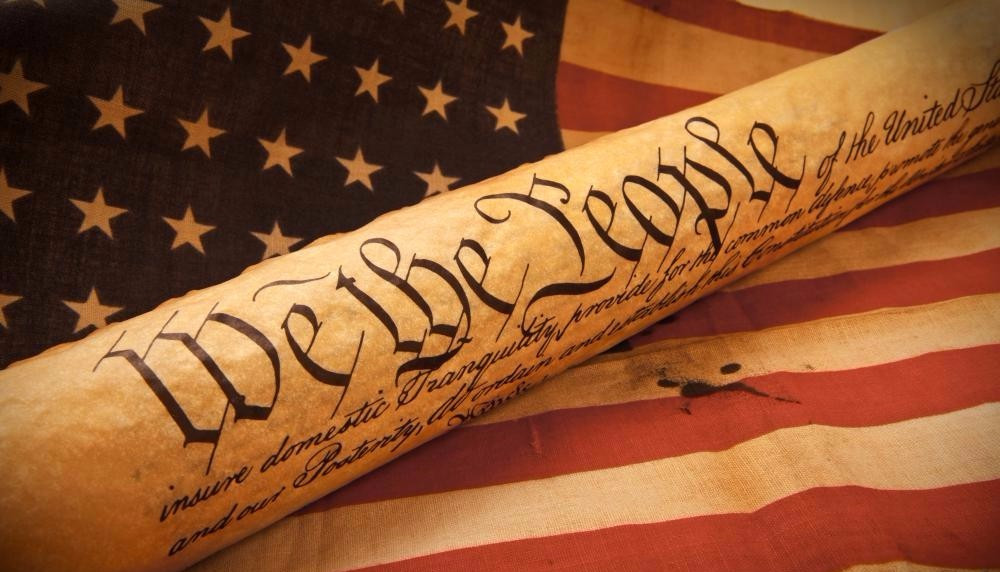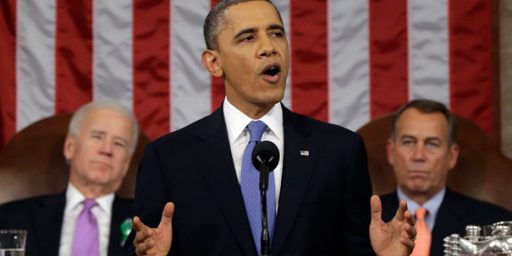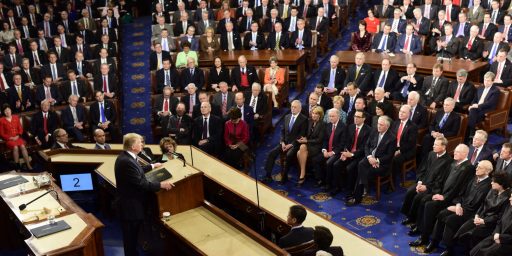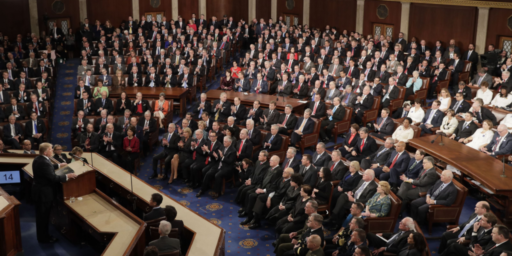The SOTU Folderol
Thoughts on politics and constitutional powers.
 This post started as a comment on James Joyner’s post about the SOTU and Speaker Pelosi’s trip to Afghanistan: Political Temper Tantrums and the Constitution. However, I realized that it was going to be long, so I figured a post was in order.
This post started as a comment on James Joyner’s post about the SOTU and Speaker Pelosi’s trip to Afghanistan: Political Temper Tantrums and the Constitution. However, I realized that it was going to be long, so I figured a post was in order.
First, I don’t think that the Speaker’s actions in regards to the SOTU is properly characterized as a “temper tantrum” nor, really, do I think of Trump’s responses as one either (more of a childish tit-for-tat, to be honest). Second, I found the discussion of the presidential power to convene congress within the post to be an interesting one.
In regards to Pelosi’s letter about the SOTU. This simply does not come across to me as a temper tantrum. On the one hand, I can accept that it has a certain pettiness to it (after all, it is denying Trump what he loves the most: making a given moment all about him). On the other, it strikes me as both 1) smart negotiation, and 2) utterly defensible. On the first point see my parenthetical in the third sentence of this paragraph: taking away the SOTU hurts Trump and does not hurt the House. As such, in the context of deadlocked negotiations this is a smart move. It threatens something Trump wants, and at a very low cost for House Democrats. On the second point, it is defensible insofar as the speech is not required. Why should the House host the president in the context of impasse over keeping the government open?
Now, granted, for some years now I have come to the position that not only is the speech pointless given the way government and technology have evolved (the congress already knows the state of the Union all of the time these days), but also because it is basically a speech from the throne that is not appropriate for a democracy. It is especially not appropriate for the POTUS to be treated with the pomp and circumstance of semi-monarch come to deign to speak to the legislature. It helps make the executive look more important than the legislature in the public eyes, never mind that most of what the president asks for in the SOTU, the congress has to create and fund. So, I have become persuaded over the years as to the following that Matthew Shugart originally wrote over a decade ago (in response to something I had written on the defunct and dearly-departed PoliBlog):
“Speech from the throne” is the term used (with certain variations) in Westminister parliamentary systems. The head of state reads a statement about what “my government…” will do in the coming year. Then once it, and the dignity of the Queen (or her representative in Canada and other Commonwealth Realms) pretending that the government speaks for everyone, is over, things go back to normal. And that normal involves the head of government being hissed and booed and subjected to harsh questions in parliament.
In this respect, the State of the Union is really the worst of both worlds. The head of state stands before the people’s representatives (oh, and the senators, too) and delivers something allegedly about the nation as a whole. But then, as head of government-and therefore a partisan leader-he (i.e. the same person, unlike in Westminster systems) never sticks around to answer tough questions and subject himself to ridicule for the absurdities he has just mouthed. Instead, the opposition has to send someone to a TV/radio studio to give an equally absurd speech that hardly anyone listens to, and thus an opportunity for the sides to engage each other when people actually are paying attention is squandered.
Another point I wanted to address was the discussion, started by Dave Shuler, about Article II Section 3 of the U. S. Constitution, especially the bolded section:
He shall from time to time give to the Congress Information on the State of the Union, and recommend to their Consideration such Measures as he shall judge necessary and expedient; he may, on extraordinary Occasions, convene both Houses, or either of them, and in Case of Disagreement between them, with Respect to the Time of Adjournment, he may adjourn them to such Time as he shall think proper; he shall receive Ambassadors and other public Ministers; he shall take Care that the Laws be faithfully executed, and shall Commission all the Officers of the United States.
Dave thinks this means:
not only does the president not require an invitation from the Congress to deliver it he or she can actually summon both houses of the Congress to deliver it.
I do not see an argument that this means the president can convene the congress for purposes of providing the SOTU. I think it means, like with Truman in 1948, the president can call congress into special session if one or both chambers has adjourned.
The fact that the power to convene a session is listed right after the SOTU requirement is irrelevant. It is just a list–after all, the next item is about receiving ambassadors and has nothing to do with the legislature whatsoever.
Really, to get back to a point made above: one could easily interpret the requirement that “He shall from time to time give to the Congress Information on the State of the Union, and recommend to their Consideration such Measures as he shall judge necessary and expedient” as being fulfilled by memos or even e-mails on a semi-regular basis. It could even be fulfilled by an address from the Oval Office. There is zero reason is has to be before a joint session of congress, and I see no constitutional imperative to support the notion.
Now, granted, as with all things, the president could try to force the congress to meet to listen to him talk, but that would likely result in a court challenge that I think the president would lose (although, granted, we wouldn’t know for sure until it happened).
At a minimum, I will note that Dave and I agree on this:
Now I happen to think that the practice of delivering the State of Union message publicly in person should be abandoned. I think it’s a custom unbecoming of a democracy and only began with Woodrow Wilson as a tool for rallying support.






I had not connected the SOTU to the ‘Speech from the Throne’, so thank you. Might also say that it’s a damn shame we borrowed the Monarch’s Speech but never thought to have ‘Question Time’.
@JohnMcC:
We didn’t borrow the Monarch’s Speech. The Constitution requires the President to advise Congress of the state of the union — albeit “from time to time” which doesn’t mean it has to happen every year. Originally, Presidents Washington and Adams chose to do this in the form of a formal address before the House and the Senate. President Jefferson changed this to the delivery of a written message a custom that every President from him until Taft followed. Wilson resurrected the idea of an in-person speech and it has been the custom ever since. We could always return to the Jeffersonian custom. Indeed I have long been in favor of this idea.
Question Time is a different thing entirely. The British (or Canadian or whatever Parliamentary nation you may choose) is the Head of Government and the head of the ruling party and therefore a member of Parliament just like everyone else. In that sense he or she is “first among equals.” The President of the United States, on the hand, is both Head of State and Head of Government and leads a separate branch of government. It would be improper, and likely unconstitutional, for Congress to summon him or her for anything akin to “Question Time.” In fact, I am aware of only one time in history when a President has testified before a Congressional Committee and that was when Ford voluntarily made himself available to answer questions about the circumstances surrounding his pardon of former President Nixon.
Mexico had a similar custom, called Informe de Gobierno (literally Government Report). It was positively imperial, with the day of the report, always September 1st, even being a national holiday, and the speech was carried by every radio station and TV channel (including cable channels). At the peak of the PRI one-party rule, the president would even parade through the streets downtown in a motorcade, then make an appearance at the balcony of the National Palace, before heading to the Congress.
This began to change in the early 90s, in the second half of President Salinas’ term, when opposition parties finally were allowed to elect people to Congress. They developed the habit of booing and heckling the president while he gave his address. This continued into president Zedillo’s term.
Things changed slowly. First the 1st of September stopped being a holiday, and cable channels were no longer required to air the speech. Then the president began to submit a written report, and would make an “address to the nation” from his offices at the National Palace. And that’s where things stand today.
The speeches before Congress, BTW, could be really long. I think the record is about 8 hours back in the 50s. Those by El Jolopo (not his real name), or el Perro as he was affectionately known, between 1976 and 1982, ran past the 2 hour mark regularly. To be fair, there was much applause to interrupt the flow of the speech, even when El Jolopo announced he would order all banks to be seized and “nationalized.” That was just before the onset of regular devaluations and mild (in comparison) hyperinflation.
BTW, Roosevelt addressed Congress in 1941 to request a declaration of war against Japan.
@Doug Mataconis:
It doesn’t have to be a speech, as you note. It certainly doesn’t have to be a major television event (it is less these days than we were kids, when pretty much that was all that was on). It doesn’t have to be to a joint session, with the cabinet, the JCS, and SCOTUS.
I don’t, for a minute, expect Question Time to happen in the US. And yes, for congress to “summon” the president would be a problem. But for the practice to happen voluntarily (which he won’t, of course) could happen.
The throne speech and QT issues are raised because they really put into context our practices by comparing them to other practices.
Part of the point is that all of this illustrates the distortions to politics created by the fusion of Head of State and Head of Government into the same person.
@Kathy:
This would be my preference as compared to what we currently do in the US.
I used to think of the SOTU in a fairly positive light (partly because It Was The Way Things Were Done)–but my thinking has shifted over the last decade.
It is interesting to think that we might find Question Time in the US to be a problem because of the equal branches, then shouldn’t we also find it problematic for the Congress and SCOTUS to treat the President like a monarch once a year? Why is it unthinkable for the President to answer questions but it is totally cool for the other branches to go through this unnecessary ceremony to elevate the President in this very public way?
I think that we buy into it because it has become a norm and because we have been conditioned accept the imperial presidency.
Speaking of Question Time, Trump would never, ever do anything like this…
@Doug Mataconis: Humm, well I won’t reread the Original but the Monarch’s Speech was referenced in a comparison to the SOTU. I hadn’t heard that analogy before. Thought it was interesting.
Thank you for the longer explanation and history.